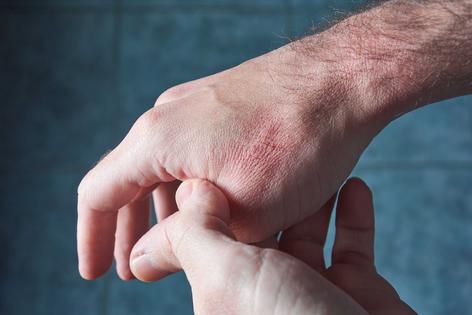Men’s Health: How To Address Sensitive Skin Conditions
Published in Health Articles
Sensitive skin can be a frustrating and sometimes embarrassing issue for men. It can cause redness, itching, dryness, and other uncomfortable symptoms. If you’re dealing with sensitive skin, you’re not alone.
This common skin type is characterized by reactivity to various triggers. These triggers can include environmental factors like pollution, extreme weather conditions, and harsh chemicals. They can also be caused by certain skincare products, stress, or underlying health conditions.
Luckily, there are various ways to address sensitive skin conditions, which include the following:
Recognize the Triggers of Sensitive Skin
Understanding what triggers your skin is key to controlling irritation. For many men, common triggers include:
Shaving: The act of shaving irritates the skin, and products with harsh chemicals can make it worse. Hot showers: While a hot shower feels great, it can strip your skin of natural oils. Weather changes: Cold, dry air in winter or hot, humid weather in summer can irritate sensitive skin. Skincare products: Some products contain fragrances, alcohol, or preservatives that can aggravate sensitive skin.Additionally, some men may have questions about unique skin features or conditions, such as pearly penile papules. These are small, dome-shaped bumps that can appear around the head of the penis and are entirely harmless. They’re a natural skin feature, and more information on penile papules can help you understand that they’re not a result of irritation, infection, or poor hygiene.
Not every man’s sensitive skin will react to these triggers the same way. Pay attention to when your skin feels itchy, tight, or red. This helps you figure out what to avoid.
Use Gentle Cleansers
For men with sensitive skin, the right cleanser in your skincare routine can make a difference. Many standard cleansers contain ingredients like alcohol, fragrance, or sulphates that can strip your skin’s natural oils, causing dryness or irritation. Switching to a gentle cleanser will help keep your skin balanced without drying it out.
Find a fragrance-free cleanser with a pH similar to your skin’s natural level (around 5.5). These types of cleansers are typically hydrating and less likely to trigger a reaction. Gel or cream-based cleansers are generally better for sensitive skin. Wash your face with lukewarm water since hot water can be drying.
Shave With Care
Shaving is one of the most common activities that can irritate men’s sensitive skin. To avoid razor burn and bumps, there are a few key steps you can take:
Use a pre-shave oil: This can help soften facial hair and prepare the skin, reducing friction between your skin and the razor.
Pick the right razor: If your skin is sensitive, a single-blade razor is often gentler than a multi-blade one.
Shave with the grain: Shaving against the grain can cause irritation. Going with the grain will help you avoid unnecessary friction.
Opt for a shaving cream that’s designed for sensitive skin, ideally one that’s fragrance-free and contains hydrating ingredients like aloe vera. After shaving, rinse with cool water and apply a soothing aftershave balm (preferably alcohol-free).
Moisturize Daily
Sensitive skin can get dry easily, especially after washing or shaving. A good moisturizer helps protect the skin’s natural barrier and reduces irritation. Look for a fragrance-free, hypoallergenic moisturizer that contains ingredients like hyaluronic acid, glycerin, or ceramides, which help hydrate without clogging pores.
Applying moisturizer right after washing or shaving locks in moisture, keeping your skin soft and hydrated. If you’re prone to breakouts, look for a lightweight or gel-based formula that won’t feel greasy. In colder months, consider a richer moisturizer to combat dryness.
Protect Your Skin From the Sun
Sun exposure can worsen sensitive skin conditions. Even on cloudy days, UV rays can penetrate the skin and cause damage, so wearing sunscreen daily is essential. Choose a broad-spectrum, SPF 30, or higher sunscreen that’s specifically designed for sensitive skin.
Watch Your Diet and Hydration
What you put in your body can impact how your skin looks and feels. Drinking plenty of water helps keep your skin hydrated from within, which can prevent dryness and irritation. Limit alcohol and caffeine, as both can be dehydrating.
Certain foods, like spicy dishes or those high in sugar, can also trigger sensitive skin flare-ups. If you notice your skin reacting after certain meals, try reducing those foods and see if it helps. Adding foods rich in omega-3 fatty acids, like salmon or walnuts, can support skin health and reduce inflammation.
Seek Help From a Dermatologist
Sometimes, home care isn’t enough. If you’re dealing with persistent redness, irritation, or breakouts that don’t improve, it might be time to consult a dermatologist. They can recommend prescription treatments or products tailored to your skin’s unique needs.
Dermatologists can also perform allergy tests if they suspect your sensitivity is due to a specific ingredient.
Your skin is an investment, and a professional can help guide you toward products and routines that make a lasting difference.
Final Thoughts
Sensitive skin is a manageable condition with the right approach. By sticking to gentle products, avoiding common triggers, and keeping your routine simple, you can keep your skin looking and feeling its best. Small changes in your routine can lead to noticeable improvements over time. Give your skin the care it deserves, and you’ll see results.
























Comments